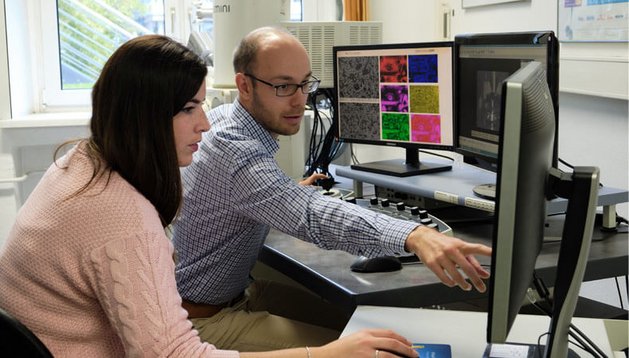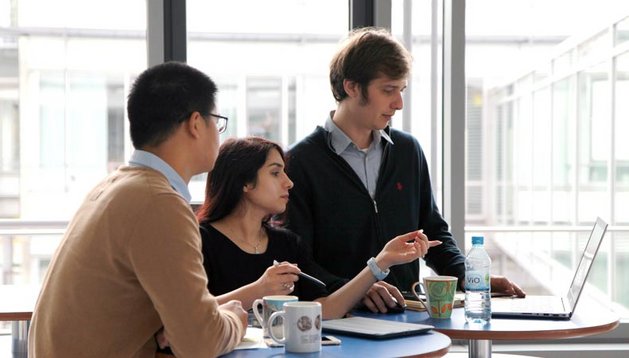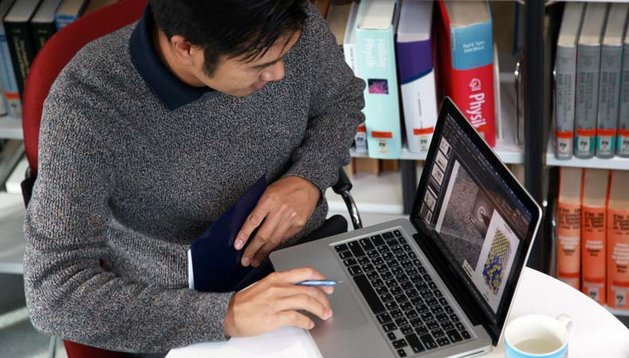ESR projects
BIOREMIA research programme will be implemented by 15 Early Stage Researchers (ESRs) recruited by the eleven beneficiary organisations.
The ESRs will carry out research on individual projects across the work-packages for designing, synthesising, characterising, and testing various biofilm-resistant materials and coatings for bone-related implant applications.
BIOREMIA will provide multidisciplinary and intersectoral scientific training at the interface of materials science and engineering, chemistry, physics, medical device technology, medical and biological sciences, in order to grow up a well-trained group of young scientists with Europe-wide connectivity.
Training structure
The BIOREMIA training programme is based on exposing the PhD fellows to a stimulating scientific and professional environment, and providing them with ample experience in interdisciplinary and intersectoral work.
The training programme will include advanced scientific topics, hands-on lab exercises, and industrial aspects beyond the standard PhD programme at universities. To maximise the employability of our ESRs we will deliver an excellent set of key transferable skills for personal and professional development.
The ESRs will be exposed to both sectors through reciprocal industry-academia secondments and participation in the Network-wide training events. The young researchers will also gain social and cultural experience of living in a different country.
The basis for the research training is a coherent, ambitious and timely research program comprised of a broad set of state-of-the-art research projects supervised by excellent scientists. The projects offers great opportunities for young researchers to move from academy into industry and vice versa, and get exposed to both environments.
The 15 ESR projects are presented in the following table where the host institutions, the ESRs and their supervisors are listed for each project, together with scientific objectives, expected results and planned secondments. During a secondment, the ESRs receive supervision and training of a receiving beneficiary or partner organisation. The duration of all secondments can be a maximum of 30% of the ESRs recruitment period. The recruitment can be between 3 and 36 months long.
BIOREMIA ESRs created lovely videos to introduce themselves and their research projects. Go have a look at our YouTube channel and let the recruited ESRs explain their work to you!
All ESR projects
| ESR project | Host Institution | Supervisor | Fellows | Details |
|---|---|---|---|---|
| ESR project ESR 1: Antibacterial coatings of metallic surfaces: From ab-initio to large scale molecular dynamics simulations | Host Institution University of Ioannina (UOI), Greece | Supervisor Prof. Christina Lekka | Fellows | Detailsdetails |
| ESR project ESR 2: Low-rigidity beta-type Ti-based alloys with intrinsic antibacterial and anti-biofilm properties | Host Institution Leibniz Institute for Solid State and Materials Research Dresden (IFW), Germany | Supervisor Prof. Mariana Calin | Fellows | Detailsdetails |
| ESR project ESR 3: Fabrication and characterisation of dense and porous Fe-Mn-(Ag,Zn) based alloys with enhanced antibacterial performance for biodegradable implants applications | Host Institution Universitat Autònoma de Barcelona (UAB), Spain | Supervisor Prof. Jordi Sort | Fellows | Detailsdetails |
| ESR project ESR 4: Fabrication and functionalization of hierarchical micro- / nano-patterned bulk metallic glasses | Host Institution Montanuniversität Leoben (MUL), Austria | Supervisor Prof. Jürgen Eckert | Fellows | Detailsdetails |
| ESR project ESR 5: Optimisation of biomechanical behavior and deformation mechanisms of antibacterial glassy alloys | Host Institution University of Cambridge (UCAM), United Kingdom | Supervisor Prof. Lindsay Greer | Fellows | Detailsdetails |
| ESR project ESR 6: Antimicrobial Bioactive Composites with controlled Resorbability | Host Institution University of Cambridge (UCAM), United Kingdom | Supervisor Prof. Serena Best & Prof. Ruth Cameron | Fellows | Detailsdetails |
| ESR project ESR 7: Design of antimicrobial mechanism of metallic patterned hydrophobic surfaces produced by dealloying and plastic flow deformation of metallic glasses | Host Institution Università degli Studi di Torino (UNITO), Italy | Supervisor Prof. Paola Rizzi | Fellows | Detailsdetails |
| ESR project ESR 8: Aqueous electrodeposition of hydroxyapatite and Ag NPs-HA and ZnO-HA composite films with antifouling performance | Host Institution Universitat Autonoma de Barcelona (UAB), Spain | Supervisor Prof. Eva Pellicer | Fellows | Detailsdetails |
| ESR project ESR 9: Corrosion and electrochemical response of new metastable Ti alloys with bacteria-killing oxide-based coatings | Host Institution The Leibniz Institute for Solid State and Materials Research Dresden (IFW), Germany | Supervisor Dr. Annett Gebert | Fellows | Detailsdetails |
| ESR project ESR 10: Sustainable manufacturing of anti-fouling and anti-bacterial bioresorbable PEG-polymer coatings for metal surfaces of implantable medical devices and nanotube-based drug delivery system | Host Institution Ashland Specialties Ireland Ltd. (Ashland), Ireland | Supervisor Dr. Udo Greiser | Fellows | Detailsdetails |
| ESR project ESR 11: Material induced inhibition of biofilm formation | Host Institution Goeteborgs Universitet (UGOT), Sweden | Supervisor Prof. Margarita Trobos | Fellows | Detailsdetails |
| ESR project ESR 12: Interplay between inflammation and regeneration and its modulation by surface and bulk composition of metallic materials | Host Institution Goeteborgs Universitet (UGOT), Sweden | Supervisor Prof. Anders Palmquist | Fellows | Detailsdetails |
| ESR project ESR 13: Bactericidal properties of precious metal-based glassy alloys: an industrial design approach towards a novel class of anti-biofouling materials | Host Institution PX Services SA (PXS), Switzerland | Supervisor Dr. Andreas Blatter | Fellows | Detailsdetails |
| ESR project ESR 14: Minimally-invasive dental implants with improved microbiological safety from Ti-based BMGs | Host Institution Anthogyr SAS (Anthogyr), France | Supervisor Dr. Nicolas Curtois | Fellows | Detailsdetails |
| ESR project ESR 15: Impact of implant coatings on osseointegration and biofilm prevention | Host Institution Stryker Trauma GmbH (Stryker), Germany | Supervisor Dr. Robin Büscher | Fellows | Detailsdetails |








